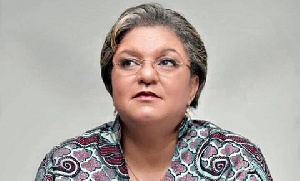 Former Foreign Affairs Minister and Member of Parliament for Awutu-Senya West, Hanna Serwaa Tetteh
Former Foreign Affairs Minister and Member of Parliament for Awutu-Senya West, Hanna Serwaa Tetteh
Former Minister of Foreign Affairs and Member of Parliament for Awutu-Senya West, Hanna Serwaa Tetteh, has raised significant questions about the Supreme Court’s decision-making process following a controversial ruling that overturned Speaker of Parliament Alban Bagbin’s decision to expel four Members of Parliament.
In a Facebook post, Ms Tetteh expressed concern over whether the justices of the Supreme Court take into account public opinion and the broader societal implications of their rulings, particularly in politically sensitive cases.
As the United Nations Secretary-General’s Special Envoy for the Horn of Africa, she highlighted the critical role the judiciary plays in preserving stability in Ghana’s democratic system, especially as elections approach.
“When the Justices of the Supreme Court take their decisions or make orders, do they listen to public commentary and reflect on the broader implications of their rulings, especially in cases with political undertones?” Tetteh asked.
She acknowledged the Judiciary’s responsibility to interpret the law impartially and ensure fair application but emphasized that these rulings occur within a society that is governed by the same laws, and involving a range of diverse stakeholders.
“We live in hyper-partisan times, and as elections draw nearer, the political environment becomes increasingly tense, putting peace and security at risk,” Ms Tetteh cautioned.
Her remarks underscore the importance of the Judiciary as a pillar of Ghana’s democracy, particularly during times of heightened political tension.
She stressed that a strong and principled Judiciary is crucial to fostering a competitive yet peaceful democratic process.
“A strong, principled Judiciary is essential for a competitive but peaceful democracy.
Their role is vital in ensuring that our democracy not only survives but thrives,” she concluded.
